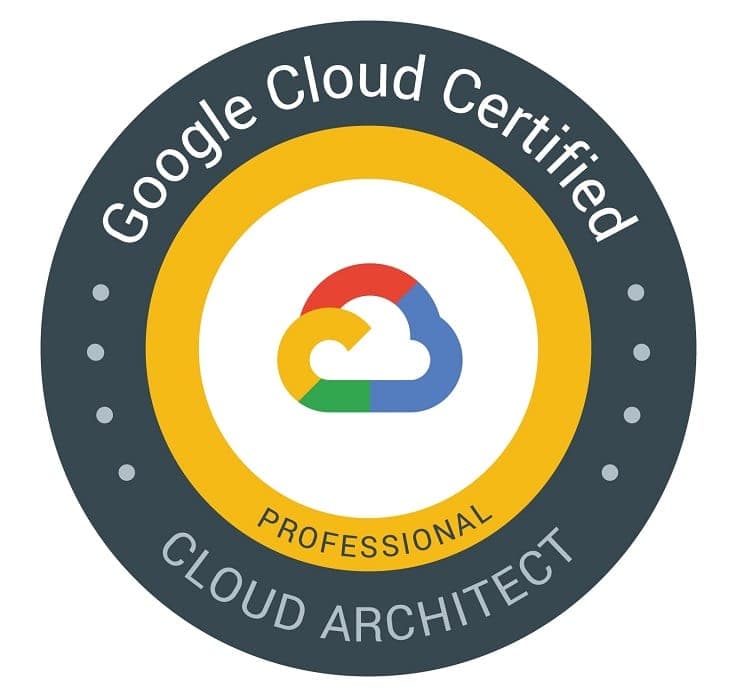Student Feedback
Professional Data Engineer: Professional Data Engineer on Google Cloud Platform Certification Video Training Course Outline
You, This Course and Us
Introduction
Compute
Storage
Cloud SQL, Cloud Spanner ~ OLTP ...
BigTable ~ HBase = Columnar Store
Datastore ~ Document Database
BigQuery ~ Hive ~ OLAP
Dataflow ~ Apache Beam
Dataproc ~ Managed Hadoop
Pub/Sub for Streaming
Datalab ~ Jupyter
TensorFlow and Machine Learning
Regression in TensorFlow
Vision, Translate, NLP and Speec...
Virtual Machines and Images
VPCs and Interconnecting Networks
Managed Instance Groups and Load...
Ops and Security
Appendix: Hadoop Ecosystem
You, This Course and Us
Professional Data Engineer: Professional Data Engineer on Google Cloud Platform Certification Video Training Course Info
GCP Data Engineering Mastery – Certification Exam Preparation
Master the Google Cloud Professional Data Engineer Certification with over 80 practical demos covering Storage, Databases, and Machine Learning services on GCP.
What You Will Learn From This Course
• Grasp fundamental concepts of Data Engineering and database management
• Provision and manage core Google Cloud Platform infrastructure services including VM, Container, GKE, App Engine, Cloud Run, and Cloud Functions
• Understand various Google Cloud Storage products for unstructured data such as Cloud Storage, Persistent Disk, Filestore, and Local SSD
• Design structured data solutions using SQL, Cloud Spanner, and BigQuery
• Store and manage large-scale semi-structured data using BigTable and Datastore
• Develop and deploy data pipelines with DataFlow (Apache Beam), DataProc (Hadoop/Spark), Data Fusion, and Cloud Composer (Airflow)
• Clean, transform, and prepare datasets using DataPrep
• Learn basic Machine Learning concepts and integrate GCP ML products into data workflows
• Search and organize datasets using Data Catalog
• Visualize data with Google Data Studio by creating reports and dashboards
• Apply prebuilt ML APIs for vision, language, and speech tasks within applications
• Build AutoML models using your datasets and deploy them for real-time predictions
• Create custom ML models using frameworks like TensorFlow, Scikit-learn, and PyTorch
• Deploy ML models as endpoints for prediction and inference
• Detect sensitive or personally identifiable data with the Data Loss Prevention API
• Store, process, and analyze petabyte-scale datasets using BigQuery
• Implement asynchronous communication using Google Cloud Pub/Sub for scalable applications
• Use in-memory storage with MemoryStore for high-performance data access
Learning Objectives
The main objective of this course is to equip learners with the skills and knowledge necessary to become a professional Google Cloud Data Engineer. By the end of this course, learners will be able to design, deploy, and manage end-to-end data solutions on Google Cloud Platform. The course emphasizes practical learning by combining theoretical concepts with hands-on exercises to ensure students can confidently implement what they learn. Key learning objectives include mastering data storage solutions, building efficient data pipelines, processing structured and unstructured data at scale, and integrating Machine Learning models into business applications. Learners will gain a deep understanding of GCP services such as Cloud Storage, BigQuery, Cloud Spanner, BigTable, DataFlow, DataProc, Data Fusion, Cloud Composer, DataPrep, and ML APIs. This knowledge will enable professionals to handle real-world data engineering challenges and prepare for the Google Cloud Professional Data Engineer certification exam.
Target Audience
This course is ideal for cloud engineers, data engineers, software developers, and IT professionals who want to advance their careers in data engineering on Google Cloud Platform. It is designed for anyone aiming to deploy scalable data pipelines, manage complex datasets, and apply machine learning models in production environments. Data engineers seeking to gain hands-on experience with GCP services and professionals aspiring to achieve Google Cloud certification will benefit significantly from this course. Additionally, individuals who want to learn how large-scale applications like Google Search, YouTube, and Gmail manage and process their data can gain valuable insights from the course material. This course is also suitable for students, IT professionals, and technology enthusiasts who wish to develop expertise in cloud-based data engineering and analytics solutions.
Requirements
To successfully participate in this course, learners should have a basic understanding of cloud computing and some familiarity with data concepts. While no prior GCP experience is required, familiarity with programming languages such as Python or SQL can be helpful. A working knowledge of databases, data structures, and basic networking concepts will enhance understanding but is not mandatory. Learners will also need access to a Google Cloud account with a valid credit or debit card for practical labs and exercises.
Prerequisites
Learners should possess enthusiasm and dedication to learning cloud technologies and data engineering concepts. A foundational understanding of databases, data modeling, and SQL will provide a head start. Basic knowledge of programming, preferably in Python, is recommended for working with data pipelines and machine learning models. Familiarity with cloud computing concepts, virtualization, and containerization will also be beneficial for navigating GCP services such as Compute Engine, Kubernetes Engine, App Engine, and Cloud Run. Learners should be comfortable working with web-based platforms and cloud consoles to fully engage with the hands-on labs provided throughout the course.
Description
Data Engineering is the practice of designing, building, and managing systems that collect, store, and analyze large volumes of data efficiently. In modern enterprises, data drives decision-making, product development, and business insights. A professional data engineer ensures data pipelines are reliable, scalable, and secure. Google Cloud Platform provides a comprehensive suite of tools and services for data storage, processing, and analytics, making it one of the fastest-growing public cloud platforms. GCP’s infrastructure is designed to handle workloads ranging from small datasets to petabyte-scale operations, offering flexibility, reliability, and high performance.
The Professional Cloud Data Engineer certification focuses on preparing individuals to manage data workflows, process structured and unstructured data, and implement machine learning solutions on Google Cloud. The course begins with a strong foundation in GCP infrastructure services, data storage options, and database offerings before progressing into more advanced topics such as data pipelines, analytics, and machine learning integration.
Core GCP Infrastructure Services
Understanding core GCP infrastructure services is essential for any data engineer. Compute Engine allows users to create and manage virtual machines for running workloads, while Google Kubernetes Engine provides a managed environment for deploying containerized applications. App Engine offers a fully managed platform for building scalable web applications, and Cloud Run allows deployment of containerized applications without managing servers. Cloud Functions enable event-driven serverless computing, ideal for lightweight processing tasks and integrating with other GCP services. IAM (Identity and Access Management) is critical for managing permissions and ensuring secure access to cloud resources. These services form the backbone of any data engineering workflow on GCP.
Data Storage Solutions in Google Cloud
Efficient data storage is fundamental to data engineering. Google Cloud offers multiple storage solutions for different types of data. Cloud Storage is ideal for unstructured data, offering high durability and scalability. Persistent Disk and Local SSD provide block storage options for compute-intensive applications. Filestore is designed for file-based storage needs and integrates with virtual machines and applications. Understanding how to choose the appropriate storage solution based on data type, performance requirements, and cost is a key skill for data engineers. The course provides practical demonstrations of how to create, manage, and migrate data across these storage services.
Structured and Semi-Structured Database Services
Structured data requires specialized storage solutions for querying and analysis. Cloud SQL offers managed relational databases with support for MySQL, PostgreSQL, and SQL Server, while Cloud Spanner provides globally distributed, highly available relational databases for enterprise workloads. For semi-structured data, BigTable offers scalable NoSQL solutions, and Datastore/Firestore provides flexible document-based databases. MemoryStore offers in-memory caching for high-speed data access. Understanding these database offerings allows data engineers to design optimal storage architectures and select the best tools for different workloads.
Hands-On Labs and Practical Exercises
The course emphasizes practical learning, with over 80 hands-on labs integrated into the curriculum. Learners will provision virtual machines, deploy containers, set up databases, migrate data, and build pipelines in the Google Cloud console. By practicing in a real cloud environment, students gain confidence and experience that theoretical learning alone cannot provide. The labs cover scenarios from basic storage operations to advanced data processing workflows, ensuring learners can apply their skills in real-world projects.
Course Modules / Sections
This course is organized into structured modules to provide a comprehensive understanding of Google Cloud Platform data engineering services. Each module is designed to progressively build the learner’s knowledge and skills, starting from foundational concepts and advancing to complex data processing and machine learning workflows. The course begins with an introduction to data engineering principles and GCP infrastructure services, followed by dedicated sections on data storage, database solutions, data processing, analytics, and machine learning integration.
The first module focuses on establishing core knowledge of data engineering and cloud computing. Learners will explore fundamental data types including structured, semi-structured, and unstructured data, understand batch and streaming data processing concepts, and gain hands-on experience with provisioning and managing virtual machines, containers, and serverless applications in GCP.
The second module dives into data storage solutions within Google Cloud. It covers Cloud Storage, Filestore, Persistent Disk, and Local SSD storage options for unstructured data. Practical exercises demonstrate how to migrate datasets from on-premise infrastructure to cloud storage efficiently while optimizing for cost, performance, and scalability.
The third module introduces database solutions for structured and semi-structured data. Students will learn how to deploy and manage Cloud SQL, Cloud Spanner, BigTable, Datastore/Firestore, and MemoryStore for high-performance, low-latency applications. This module also explores data modeling best practices and database optimization techniques relevant to enterprise-level workloads.
The fourth module focuses on data processing and analytics. Learners will build end-to-end data pipelines using DataFlow (Apache Beam), DataProc (Hadoop/Spark), and Cloud Data Fusion for drag-and-drop pipeline creation. Cloud Composer (Airflow) is introduced for workflow orchestration, enabling scheduling, monitoring, and automation of complex data processes. Learners will also explore BigQuery for large-scale data analysis, Pub/Sub for asynchronous messaging, and Data Loss Prevention API for securing sensitive data.
The fifth module introduces Machine Learning and AI integration on GCP. Students will learn to prepare data with DataPrep, use prebuilt ML APIs for vision, language, and speech tasks, and build custom machine learning models using TensorFlow, Scikit-learn, and PyTorch. AutoML integration is demonstrated for simplified model creation, and BigQuery ML is explored for performing machine learning directly within the data warehouse. The module concludes with visualization techniques using Google Data Studio to create actionable reports and dashboards.
Each module is supplemented with extensive hands-on labs, exercises, and real-world examples to reinforce learning outcomes. Students are encouraged to replicate workflows in a live Google Cloud environment to gain practical experience and confidence in deploying scalable data solutions.
Key Topics Covered
The course covers a wide range of topics essential for mastering Google Cloud Professional Data Engineering. Key topics include foundational concepts, practical implementation techniques, and advanced data engineering workflows.
Data engineering fundamentals are introduced first, covering essential concepts such as data pipelines, data ingestion, batch processing, and streaming workflows. Students learn how to identify the appropriate data processing methods for different types of workloads and implement scalable solutions on cloud infrastructure.
GCP infrastructure services are covered in detail, including Compute Engine for virtual machines, Google Kubernetes Engine for container orchestration, App Engine for serverless applications, Cloud Run for containerized workloads, and Cloud Functions for event-driven processing. IAM and resource management are also included to ensure learners understand security, access control, and compliance requirements.
Data storage solutions include Cloud Storage for object storage, Filestore for file-based storage, Persistent Disk and Local SSD for block storage, and best practices for storage optimization and cost management. Practical labs demonstrate uploading, migrating, and managing data in these storage systems.
Database services focus on structured and semi-structured data management. Students explore Cloud SQL for relational data, Cloud Spanner for distributed relational databases, BigTable for NoSQL workloads, Datastore/Firestore for document-based storage, and MemoryStore for in-memory caching. Techniques for data modeling, indexing, query optimization, and performance tuning are also included.
Data processing and analytics cover building data pipelines with DataFlow (Apache Beam), DataProc (Hadoop/Spark), and Data Fusion. Workflow orchestration using Cloud Composer (Airflow) is demonstrated with scheduling, monitoring, and automation techniques. Pub/Sub is introduced for asynchronous communication and real-time streaming, while BigQuery is covered extensively for large-scale data analytics, SQL-based processing, and integration with other GCP services. Data cataloging and securing sensitive data using DLP API are also explored.
Machine learning and AI topics focus on practical applications within GCP. DataPrep is used to clean and prepare datasets, prebuilt ML APIs are integrated into applications for vision, language, and speech processing, and AutoML is used to create models without extensive programming. Custom ML models are built using TensorFlow, Scikit-learn, and PyTorch, and BigQuery ML enables model training directly within the data warehouse. Visualization techniques with Google Data Studio help learners transform insights into actionable dashboards and reports.
Throughout the course, emphasis is placed on applying best practices, optimizing workflows for performance and scalability, and aligning solutions with real-world business requirements.
Teaching Methodology
This course employs a hands-on, practical approach to teaching Google Cloud data engineering concepts. The methodology combines theoretical explanations with live demonstrations and interactive labs to reinforce understanding and facilitate skill development. Each topic is introduced with a conceptual overview, followed by step-by-step demonstrations in the Google Cloud console to illustrate real-world implementation.
Practical labs are central to the teaching approach. Students provision cloud infrastructure, deploy applications, configure databases, build data pipelines, and implement machine learning models in an environment that simulates enterprise-scale workloads. The labs encourage learners to experiment with different configurations, troubleshoot issues, and optimize performance, providing experiential learning that complements theoretical knowledge.
Video lectures are designed to be comprehensive yet easy to follow, explaining each concept with practical examples, workflow demonstrations, and visual aids. Learners are guided through complex processes such as data ingestion, pipeline creation, and machine learning deployment in a clear, step-by-step manner. Emphasis is placed on learning by doing, ensuring students develop practical competencies alongside conceptual understanding.
Supplementary learning materials, including code samples, configuration files, and reference documentation, are provided to support hands-on exercises. These resources allow learners to replicate workflows independently, reinforce knowledge retention, and gain confidence in applying skills to real-world scenarios.
Assessments are integrated throughout the course to monitor progress and ensure learners can apply concepts effectively. Regular practice exercises, quizzes, and hands-on challenges encourage mastery of core topics and identify areas requiring additional focus.
The course also emphasizes industry best practices, including secure handling of sensitive data, efficient use of cloud resources, cost optimization, and scalable architecture design. By combining theory, practical exercises, and best practice guidance, the teaching methodology ensures learners gain comprehensive expertise in Google Cloud data engineering.
Assessment & Evaluation
Assessment and evaluation in this course are designed to measure both conceptual understanding and practical proficiency. Multiple methods are employed to ensure learners demonstrate mastery of the material and can apply skills in real-world scenarios.
Hands-on lab assignments form a significant component of evaluation. Students complete exercises such as provisioning cloud infrastructure, configuring storage solutions, deploying databases, building data pipelines, and integrating machine learning models. Each lab is structured with clear objectives, step-by-step instructions, and expected outcomes to facilitate self-assessment and learning reinforcement. Completion of these labs is essential for gaining practical experience and preparing for certification exams.
Quizzes and knowledge checks are incorporated throughout the course to assess conceptual understanding. These assessments cover fundamental topics, including data types, GCP services, storage solutions, database management, data processing, analytics, and machine learning integration. Quizzes provide immediate feedback, enabling learners to identify gaps in knowledge and review topics as needed.
Project-based evaluations simulate real-world scenarios where learners must design, implement, and optimize end-to-end data solutions on GCP. Projects may include building scalable data pipelines, deploying ML models, or analyzing large datasets using BigQuery. Evaluation criteria focus on correctness, efficiency, scalability, and adherence to best practices.
Learners are encouraged to document their workflows, maintain code repositories, and present solutions in a structured format. This approach reinforces professional skills such as code organization, version control, and reporting, which are essential for data engineering roles.
Participation in discussion forums and Q&A sections contributes to assessment by encouraging collaboration, problem-solving, and knowledge sharing among peers. Active engagement in the learning community supports deeper understanding and provides exposure to diverse approaches and solutions.
The course is structured to ensure learners achieve competence in both practical and theoretical aspects of Google Cloud data engineering. Assessment and evaluation methods are aligned with the Google Cloud Professional Data Engineer certification objectives, preparing students to succeed in real-world projects and certification exams.
By completing the modules, hands-on labs, quizzes, and projects, learners gain a comprehensive understanding of data engineering workflows on GCP. They develop the skills to design scalable, secure, and efficient data solutions, integrate machine learning models, and generate actionable insights from large datasets. Evaluation ensures that learners can apply these competencies effectively, providing a strong foundation for professional advancement in cloud-based data engineering.
Benefits of the Course
This course provides a comprehensive pathway for learners to gain practical and theoretical expertise in Google Cloud Professional Data Engineering. By completing the course, students will develop the ability to design, deploy, and manage end-to-end data pipelines on Google Cloud Platform. The hands-on labs ensure that learners gain real-world experience with cloud infrastructure, storage solutions, databases, data processing, and machine learning workflows.
Learners will benefit from mastering key GCP services such as Compute Engine, Kubernetes Engine, App Engine, Cloud Run, Cloud Functions, Cloud Storage, Filestore, Persistent Disk, Cloud SQL, Cloud Spanner, BigTable, Datastore/Firestore, MemoryStore, DataFlow, DataProc, Cloud Data Fusion, Cloud Composer, Pub/Sub, BigQuery, DataPrep, ML APIs, and AutoML. This deep understanding prepares students to handle enterprise-scale data workloads efficiently and implement best practices for security, scalability, and cost optimization.
The course enhances career readiness by aligning its content with the Google Cloud Professional Data Engineer certification objectives. Learners gain the confidence and skills to apply for high-demand roles in cloud computing, data engineering, and machine learning, positioning themselves for career growth and higher earning potential. Additionally, students will acquire the ability to visualize and communicate data insights effectively using Google Data Studio, which adds value to decision-making processes within organizations.
Practical experience with cloud infrastructure, data pipelines, and machine learning deployments ensures learners can execute tasks required by modern enterprises handling large-scale data. The course also emphasizes problem-solving, troubleshooting, and performance optimization, which are critical skills for professional data engineers. By the end of the course, students will be capable of building fully functional, scalable data solutions on Google Cloud, making them highly competitive in the job market.
Course Duration
The course spans 16+ hours of high-quality video content, providing a balance between theoretical instruction and practical application. Each module is structured to ensure thorough coverage of all major topics while allowing sufficient time for hands-on exercises and lab practice. The video content is divided into digestible segments to facilitate step-by-step learning, enabling students to progress at their own pace.
In addition to the video lectures, the course includes over 80 practical labs and exercises. Each lab is designed to reinforce concepts covered in the videos, allowing learners to implement what they have learned in a real cloud environment. The duration of each lab varies depending on complexity, but all are structured to ensure completion within a reasonable timeframe while maximizing practical learning.
Students are encouraged to allocate additional time for reviewing course materials, experimenting with workflows in GCP, and completing optional exercises to deepen understanding. The combination of structured video content, practical labs, and independent exploration provides a comprehensive learning experience within the 16+ hour course duration.
Tools & Resources Required
To fully benefit from this course, learners will need access to specific tools and resources that facilitate hands-on learning and practical implementation of data engineering workflows on Google Cloud Platform.
A Google Cloud account is essential for completing the labs and exercises. Students will need a valid debit or credit card to activate their account, which allows access to free-tier services and cloud resources required for practical assignments. The account provides a live environment where learners can provision infrastructure, configure storage and database services, deploy applications, build data pipelines, and integrate machine learning workflows.
Familiarity with programming, especially in Python and SQL, is recommended for interacting with data, writing queries, and developing machine learning models. Python libraries such as Scikit-learn, TensorFlow, and PyTorch are utilized in the course for custom model development and deployment. Knowledge of command-line tools and basic shell scripting is also beneficial for managing cloud resources and automating tasks.
Learners should have access to a web browser and internet connectivity to interact with the Google Cloud Console and access course materials, video lectures, and labs. An IDE or code editor, such as Jupyter Notebook, VS Code, or PyCharm, is recommended for writing and testing scripts, building models, and running data processing tasks.
Supplementary resources provided in the course include code samples, configuration files, reference documentation, and instructional guides to assist learners in completing labs and understanding advanced concepts. These resources are designed to support hands-on practice and ensure students can replicate workflows independently, even outside of the structured lab environment.
The course also emphasizes the use of free or trial-based cloud resources whenever possible, allowing learners to experiment with different configurations and services without incurring significant costs. By combining the Google Cloud platform, programming tools, and instructional resources, learners are fully equipped to gain practical expertise and confidently apply their knowledge in professional settings.
Overview of Practical Learning Approach
The course integrates a practical learning methodology that ensures learners gain hands-on experience with real-world data engineering workflows. All modules include lab exercises designed to replicate scenarios encountered in enterprise environments. Students provision virtual machines, set up containers, deploy serverless applications, and configure storage and database solutions to handle structured and unstructured data efficiently.
Data pipelines are built and deployed using services such as DataFlow, DataProc, and Cloud Data Fusion, with orchestration handled by Cloud Composer (Airflow). Learners gain experience with both code-based and drag-and-drop pipeline development, enabling flexibility in implementing scalable solutions. Practical exercises cover streaming and batch processing, asynchronous communication with Pub/Sub, and large-scale analytics with BigQuery.
Machine learning integration is also hands-on, with labs demonstrating data preparation using DataPrep, leveraging prebuilt ML APIs, building AutoML models, and creating custom ML models using Python frameworks. Students deploy models as endpoints for real-time predictions and integrate insights into visualization dashboards using Google Data Studio.
The course provides step-by-step guidance for all exercises, allowing learners to practice independently while reinforcing concepts from video lectures. Each practical session emphasizes problem-solving, optimization, and best practices for performance and security.
Expected Outcomes
Upon completing this course, learners will be equipped with the skills to implement comprehensive data engineering solutions on Google Cloud Platform. They will be capable of provisioning cloud infrastructure, managing storage and database services, building and orchestrating data pipelines, integrating machine learning workflows, and visualizing data insights effectively.
Students will also be prepared for the Google Cloud Professional Data Engineer certification, with practical experience aligned to exam objectives. The combination of theoretical knowledge, hands-on labs, and exposure to real-world workflows ensures learners can confidently apply their skills in professional settings, manage large-scale data workloads, and contribute to organizational data strategies effectively.
The course outcomes position learners for career advancement in cloud computing, data engineering, and machine learning, providing practical experience that can be leveraged in enterprise projects or personal initiatives.
Career Opportunities
Completing the Google Cloud Professional Data Engineer course opens up a wide range of career opportunities in cloud computing, data engineering, and analytics. Graduates of this course are equipped with practical skills to design, implement, and manage data pipelines and analytics solutions at scale, which are highly sought after in today’s data-driven industry.
Cloud Engineer roles involve deploying and managing infrastructure, implementing secure access controls, and optimizing cloud resources to handle workloads efficiently. Professionals in this position work with various Google Cloud services to maintain scalable and reliable data solutions.
Data Engineer positions are in high demand across industries such as finance, healthcare, retail, e-commerce, and technology. These roles focus on building robust data pipelines, integrating data from multiple sources, performing data transformations, and ensuring high data quality. Expertise in GCP storage, database, and processing services enables data engineers to manage large-scale datasets and provide actionable insights to stakeholders.
Machine Learning Engineer and AI Specialist roles benefit from this course as it covers the integration of ML models into business applications. Learners gain experience building custom models, deploying them on GCP, and using BigQuery ML and AutoML to analyze large datasets. Professionals in these positions are responsible for training models, optimizing performance, and deploying predictive analytics solutions to solve real-world business problems.
Business Intelligence and Data Analytics roles also benefit from knowledge gained in this course. Students learn how to visualize data with Google Data Studio, create interactive dashboards, and provide insights that inform strategic decisions. Organizations increasingly rely on data-driven reporting to guide operations, marketing, and product development, making these skills highly valuable.
The course also prepares learners for certification, which enhances credibility and career prospects. Google Cloud certified professionals often experience career growth, increased responsibility, and opportunities to work on complex, high-impact projects. By gaining hands-on experience with over 80 labs and practical exercises, learners are well-prepared to excel in professional roles that demand both technical expertise and problem-solving abilities.
Benefits of Google Cloud Certification in Career Growth
Google Cloud certifications, particularly the Professional Data Engineer credential, are widely recognized and respected in the technology industry. Certified professionals demonstrate proficiency in designing, building, and managing data solutions on GCP, making them attractive candidates for employers seeking cloud expertise.
Certification can lead to higher salaries, greater responsibilities, and opportunities to work on cutting-edge projects involving data engineering, analytics, and machine learning. Organizations often prioritize certified individuals for leadership roles in cloud projects, data strategy, and technology innovation.
The knowledge and skills acquired through this course empower professionals to contribute to enterprise-level data initiatives, implement efficient data pipelines, secure sensitive information, and optimize cloud resources. These capabilities not only support career advancement but also enhance the ability to deliver tangible business value through data-driven insights.
Conclusion
The Google Cloud Professional Data Engineer course provides a comprehensive, hands-on approach to mastering data engineering on GCP. Through structured modules, practical labs, and real-world workflows, learners acquire the skills necessary to design, implement, and manage scalable data solutions.
The course covers foundational concepts of data engineering, cloud infrastructure, storage solutions, database offerings, data processing, analytics, and machine learning integration. Learners gain experience with essential GCP services including Compute Engine, Kubernetes Engine, App Engine, Cloud Run, Cloud Functions, Cloud Storage, Filestore, Persistent Disk, Cloud SQL, Cloud Spanner, BigTable, Datastore/Firestore, MemoryStore, DataFlow, DataProc, Data Fusion, Cloud Composer, Pub/Sub, BigQuery, DataPrep, ML APIs, and AutoML.
Hands-on labs reinforce theoretical knowledge by allowing learners to provision infrastructure, configure storage and database services, build data pipelines, integrate machine learning models, and visualize insights in real-world scenarios. This practical approach ensures learners are well-prepared to apply skills in professional settings and successfully achieve Google Cloud Professional Data Engineer certification.
Completing the course positions learners for a variety of high-demand roles, including Cloud Engineer, Data Engineer, Machine Learning Engineer, AI Specialist, and Data Analyst. Professionals can leverage these skills to drive business insights, optimize cloud infrastructure, and implement scalable, efficient data workflows. Certification enhances credibility, increases career opportunities, and supports long-term professional growth in the rapidly evolving cloud and data engineering landscape.
The course also emphasizes industry best practices for data security, cost optimization, performance tuning, and workflow automation, equipping learners with knowledge applicable to enterprise-scale projects. By mastering Google Cloud’s data engineering services, students gain a competitive advantage in the job market and the ability to contribute meaningfully to organizational data strategies.
Enroll Today
Enroll today to gain practical, hands-on expertise in Google Cloud Professional Data Engineering. Begin your journey toward mastering data storage, database management, data processing, analytics, and machine learning on Google Cloud Platform. With 16+ hours of video content, over 80 hands-on labs, and real-world examples, this course equips learners with the skills to implement scalable data solutions, earn professional certification, and advance their careers in cloud computing and data engineering.
Start building your expertise today and transform your career by becoming a proficient Google Cloud Data Engineer, ready to tackle the challenges of modern enterprise data workloads and deliver actionable insights that drive business growth.













